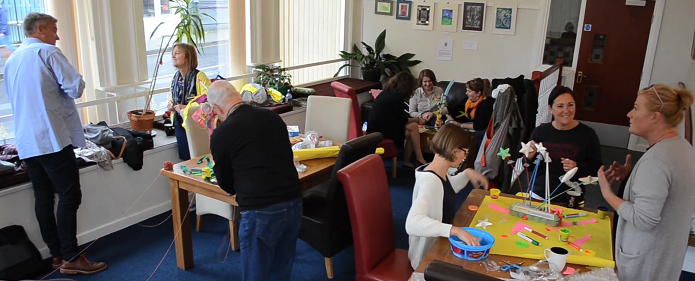
Although increasingly widely used across Europe, social pedagogy has taken longer to be adopted in the United Kingdom for several reasons.
Anglesey-based social enterprise ThemPra Social Pedagogy CIC set out to change that when they partnered with educational and social care organisations from across Europe for a project backed by a €233,000 Erasmus+ grant.
Describing social pedagogy as ‘a holistic, relationship-centred way of working with children, young people and adults in educational and care settings’, ThemPra has been working to raise awareness and use of its practices since 2007.
“We work with people through relationships and we focus on building positive, authentic relationships. We help them build positive relationships with people in their social network,” said project coordinator Gabriel Eichsteller.
Scaling up social pedagogy in the UK has faced issues around the cost of training and a lack of free comprehensive learning resources, however, so the project set out with a main aim of establishing free, open access information and training resources.
Collaborators from across Europe, where social pedagogy is more established, and from different sectors were vital and partners were enlisted in Spain, Germany, Denmark, Belgium and Czechia as well as the UK.

“We wanted to bring in an international perspective on this because of the different traditions of social pedagogy across countries," said Gabriel. "We thought it would be interesting in helping people consider what they can learn from experiences in other countries.”
“That openness to cross-sector collaboration has been fantastic, because it’s given us an opportunity to work with universities and practice organisations.
“I think that added an interesting dimension. It meant our academic partners couldn’t just think about theory and research - they also had to think about practice and how the research would help.
“Our partners recognised that there was a lot we could learn from each other and we have lots in common,” explained Gabriel. “There’s just so many innovative ideas going around that we can learn from; our partners were really open to this and could see a lot of benefits.”
Utilising digital tools
The partners developed a massive open online course (MOOC), divided into eight modules. each organisation produced a module focused on one aspect of social pedagogy in their respective country, while ThemPra created the introductory session.
To make the resource accessible for all the course was designed to be self-paced and, so far, roughly 2,500 learners have engaged with it.

“The great thing is, because it’s free, it doesn’t just end now; people can continue to use it," said Gabriel. "We’re in the process of launching a Spanish version, which will be fantastic, particularly for people in Latin America who don’t necessarily have access to university education.”
Feedback from MOOC graduates has been positive, and many organisations have started to use it as a learning resource for their whole teams. Several universities are also using various sessions as part of their curriculum.
The MOOC has begun to become a significant resource contributing to intercultural learning and dialogue around the benefit of social pedagogy.
Along with the MOOC, the partners created an insight report highlighting how social pedagogy can help educators and social care professionals and sharing innovative practices.
Evergreen impact
As well as the resources developed, ThemPra have seen organisational benefits from being involved in an Erasmus+ project.
“It’s given us a strong international network of organisations, a route into being part of the wider, international discourse,” said Gabriel.
“That openness to cross-sector collaboration has been fantastic, because it’s given us an opportunity to work with universities and practice organisations.
“By and large, the project has been brilliant. All partners have just brought something that’s unique. They’ve all been really motivated to take part and contribute, and I think they’ve all loved the experience.
“We’ve really seen that, with the MOOC, it has shown people that social pedagogy is an important, growing profession that is worth knowing more about.”
Inspired by ThemPra Social Pedagogy’s project? Visit our webpage for funding opportunities in cross-sector strategic partnerships.
